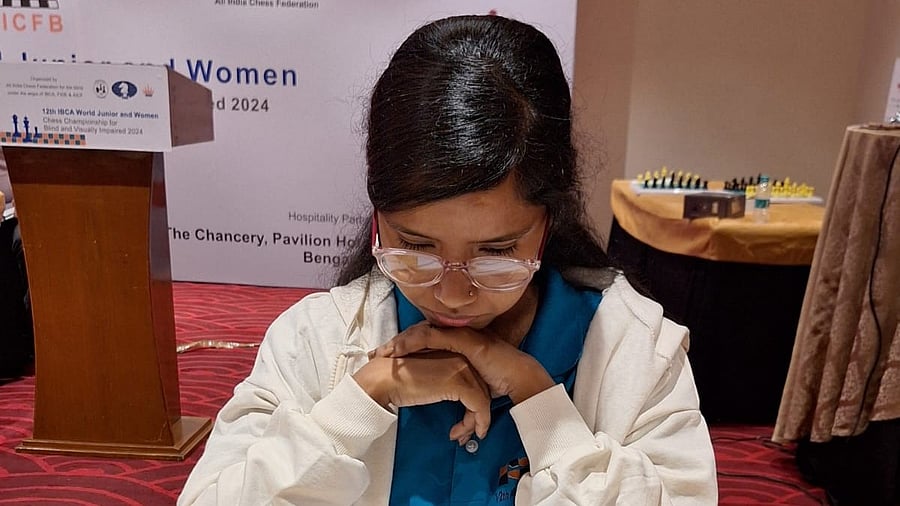
Megha Chakraborty.
Bengaluru: Seated across Megha Chakraborty, Tanish Waghmore and John Haris, the weight of their arduous lives rests palpably in the space between, but their mastery of gratitude and contentment forces one to rapidly mature beyond basic sentiments such as pity, sympathy even.
At this point, the conversation is with three purveyors of chess. That they are visually impaired becomes an ignorable detail because their lack of vision has not impaired their mind nor their mentality.
In this nuance lies their confidence, the kind of which held up their spines and smiles in the just-concluded IBCA World Junior and Women Chess Championship in Bengaluru.
But, even these players, the best among the visually impaired chess proponents in the country, were not lost to sentiment of being ignored. Of course, they hoped to skip past the fact in haste and get onto something more optimistic, but in doing so, they let on more than they held back.
Sure, 30-odd players from India got to play some of the best players in the world and got the exposure they so enjoy, but nothing beyond the confines of a conference room at a hotel in the City suggested that there are world champions plying their wares.
Typically, you'd point fingers at the organisers for not getting things in order. Here, though, the All India Chess Federation for the Blind & Visually Impaired (AICFB) can't be held accountable for the government doesn't consider blind chess worthy of recognition.
Therefore, the problem is in the finances. In fact, the AICFB has incurred a significant loss at the end of this tournament. And yet, Charudatta Jadhav, the president of AICFB, is smiling away, speaking of how the sport has grown.
"The government needs to step in, but we have gone about our business with pride and we have done wonders since our inception in 1997," he says. "One person who has played a massive part in our legacy is Vishy (Viswanathan Anand). Besides developing strategies for us, and helping our players on the board, he even has helped us out financially. We are so grateful for all the support we have received from him and so many players from the new generation too."
Jadhav has been in the business of promoting and propagating chess among the visually impaired for over three decades now. He too is visually impaired, and has every reason to feel resentment towards those who have not come forward with a lending hand.
But, nope. There's none of that here. Not even when it's mentioned that sighted chess is raking in the money in the aftermath of their success at the Olympiad recently.
"Sighted chess in India is getting everything it deserves. We are very happy for them," he says.
Jadhav at this point is preparing for the closing ceremony of the Worlds and gets pulled away. He's grateful for the interaction.
Speaking of gratitude, Megha, Tanish and John - all visually impaired from birth - are still sitting by a drained-out swimming pool with barricades barely in place.
Megha and Tanish move around without the aid of walking sticks or people. John has his father's hands to grip on to. Circumstance be damned, they're just happy to get into the intricacies of the sport.
"... it's the same chess board but there are small holes so we can slot in the pieces," explains Megha, the 2018 Asian Para Games silver and bronze medallist. "There are pins at the bottom of the pieces, and the pieces have braille dots on them so we know which pieces we have to move.
Tanish jumps in: "We announce each time we make a move so the other person knows where on the board the pieces are."
John, all of 13-years-old, is a bit more reticent in conversation, but offers keen insight when prodded. "... because the boards are the same, this is one of the few games where sighted players and visually impaired players can play against each other," he says. "This sport is all in the mind. We don't really need our eyes for that."
Both Megha and Tanish agree, but they are not much worried about playing those of the sighted variety. All they want to do is be the best at their craft in their space.
"We train just like the sighted players do. We only use different softwares while doing so, but as far as keeping up with them (sighted players) goes, we can, but that's not our vision. Our vision is about bigger. We want to be part of something bigger, a narrative change," says Tanish.
In the midst of all these vacillating emotions, you see it. It's in their smile, in their voices, in the tone of their telling of their own stories...
You sense gratitude, pride, lack of self-pity, and a wondrous desire to look beyond themselves for the greater good of their community.
Now, that's an education.